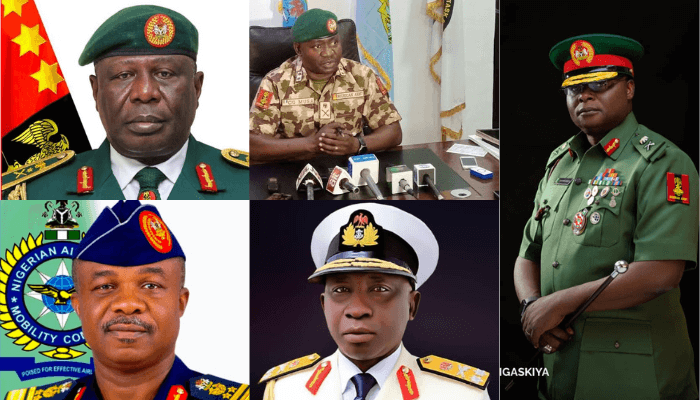How new service chiefs’ appointment can affect fight against terrorism
The appointment of new service chiefs is seen as a major step towards reducing the rising spate of terrorism in the nation.
President Bola Tinubu, last week, appointed Olufemi Oluyede as the new chief of defence staff, sacking Christopher Musa.
Oluyede will now oversee the coordination of all military operations across the Army, Navy, and Air Force.
He also appointed Waidi Shuaibu as the new chief of army staff. While Sunday Kelvin Aneke is the new chief of air staff, Idi Abbas is the chief of naval staff.
The appointments have attracted mixed feelings from security chiefs, with some saying that the new officers have the capacity to quell the growing spate of terrorism in the country, and others sensing politics.
Read also: Tinubu meets new service chiefs
Shehu Sadeeq, a retired military officer, said the president’s decision to keep changing military leadership appears to be a continuous effort to find capable hands who can deliver results.
“What the president is doing is to continue searching until he finds people that can complete the job,” Sadeeq said, noting that the new appointees should be given time to prove themselves.
Sadeeq stressed that genuine progress against insecurity requires honest communication between the armed forces and the nation’s political leadership.
He accused some military officers of being too diplomatic when briefing the president, instead of presenting the true picture of operational realities.
“A soldier is not a politician. When you meet the President and Commander-in-Chief, tell him what you need. You are not a magician. Stop giving false hope,” he said.
He noted that Nigeria’s armed forces remain grossly under-resourced both in manpower and equipment, describing the current troop strength as ‘far from adequate.’
Sadeeq criticised the long-standing practice of redeploying soldiers from one hotspot to another, saying it only shifts insecurity rather than addressing it.
“If they attack Zamfara, troops are moved there from Zaria or Borno. But when Zaria is attacked, where will they move troops from again? We’re just chasing shadows,” he said.
Ishaq Monguno, a retired naval officer, said he trusts the president’s capacity to appoint men who can deliver results.
“No matter what the reasons are, you cannot keep doing one thing over and over and expect a different result. The president was right in changing them at this time. With new people come new strength, new desires and new methodologies to fight terrorism and rising insecurity in the nation.”
Read also: Meet newly appointed service chiefs
Politics is paramount
However, Auwal Rafsanjani, Executive Director of the Civil Society Legislative Advocacy Centre (CISLAC), warned that Nigeria’s growing tendency to retire well-trained and experienced military officers for political reasons is undermining the strength, discipline, and professionalism of the armed forces.
Rafsanjani, who spoke with BusinessDay while assessing recent changes in the nation’s security leadership, said politically-motivated retirements erode institutional memory, waste years of investment in training, and weaken the country’s overall defence capability.
He urged the government to prioritise merit, competence, and continuity over political considerations in future military appointments, stressing that such arbitrary decisions are detrimental to national security.
“We cannot keep wasting billions training officers only to retire them for political reasons. The younger recruits cannot replace that level of experience overnight,” he warned.
On the recent appointment of new service chiefs, the CISLAC boss said President Bola Tinubu acted within his constitutional powers, explaining that military appointments typically run for two to three years.
However, he cautioned that mass retirements driven by politics, rather than performance, weaken institutional capacity and disrupt command stability.
Rafsanjani noted that Nigeria’s insecurity will persist unless the government addresses deep-rooted issues such as corruption in defence procurement, poor military welfare, and lack of coordination among security agencies.
He criticised the persistent corruption in defence spending, saying that despite huge budgetary allocations, there is little evidence of modern equipment, adequate logistics, or improved operational readiness among troops.
“The alleged corruption in defence procurements has not been addressed. The provision for modern equipment and facilities to confront insecurity has not been met despite the military allocations,” he said.
The CISLAC chief also decried the poor welfare and motivation of security personnel, pointing to unresolved issues around promotions, training, and retraining.
He warned that neglecting troop welfare undermines morale and operational effectiveness.
He called for a clearer definition of roles among security agencies and stronger cooperation, coordination, and intelligence-sharing frameworks.
Beyond structural overlaps, Rafsanjani expressed concern over weak border management and rising oil theft, accusing relevant agencies such as the Nigeria Customs Service of failing to stop the smuggling of arms and crude oil.
Read also: Nigerians deserve to know the truth behind service chiefs’ sack – ADC
Emmanuel Onwubiko, national coordinator of the Human Rights Writers Association of Nigeria (HURIWA), accused the president of removing the former service chiefs for political and personal reasons.
He claimed the shake-up was more about self-preservation than tackling insecurity.
“I don’t believe the president changed the service chiefs because of insecurity. He did it for selfish interests, out of fear of a possible coup,” Onwubiko alleged.
He argued that if the decision were truly about improving national security, the president would have also sacked the Inspector-General of Police, whom he described as ineffective.
He argued that Nigeria’s security challenges remain complex, requiring not just leadership changes but also deeper reforms, particularly in funding, manpower, and strategic coordination, across the nation’s security institutions.

